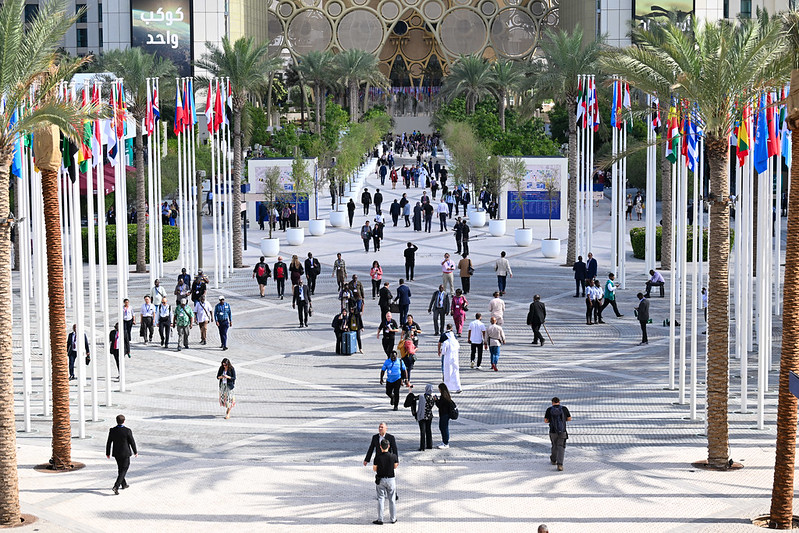
- Details
- By Jenna Kunze
Leaders from nearly every nation across the world—including Indigenous representatives from North America—will meet today in Dubai, United Arab Emirates, to begin a nine-day climate conference known as the Conference of Parties, or COP28.
Representatives from almost 200 countries have gathered for the COP annually since 1994, where world leaders negotiate international environmental treaties aimed at reducing carbon emissions and limiting global temperature rise under the United Nations Framework Convention on Climate Change.
The first legally binding international treaty came in 2015 at the COP in Paris, France, when world countries adopted The Paris Agreement. The treaty’s stated goal is to hold “the increase in the global average temperature to well below 2°C above pre-industrial levels” and pursue efforts “to limit the temperature increase to 1.5°C above pre-industrial levels.”
This is the first year countries will examine their progress.
More than 70,000 delegates are expected to attend COP28, according to the United Nations, including the heads of state, youth, climate scientists, and Indigenous Peoples. The White House announced this week that President Biden won’t be attending, but Vice President Kamala Harris will be there in his place.
Counted among Indigenous representatives this year is Fawn Sharp (Quinault Indian Nation), the former president of the National Congress of American Indians and the vice president of the Quinault Indian Nation. Sharp told Native News Online she was invited to COP by the US State Department to join the US Delegation. She will facilitate the high-level meeting and listening session between Special Presidential Envoy for Climate John Kerry, and global Indigenous leaders.
Additionally, Native chef and food sovereignty leader Sean Sherman (Oglala Lakota) was invited to COP on behalf of the Global Alliance for the Future of Food and the Rockefeller Foundation. Sherman will participate in a panel discussion on Indigenous food and knowledge as a pathway to both mitigating and adapting to climate change, his staff at North American Indigenous Food Systems (NATIFS) said. Sherman founded NATIFS in 2017 the address the economic and health crises affecting Native communities by re-establishing Native foodways.
Sherman will join the voices of other Indigenous food leaders, including Michael Kotutwa Johnson (Hopi), who serves as an Assistant Specialist at the Indigenous Resiliency Center at the University of Arizona, and Lourdes Inga (Quechua heritage from Peru) Executive Director of International Funders for Indigenous Peoples, NATIFS said in a statement.
“Together, we can work towards a regenerative, permaculture landscape to withstand adverse effects of climate change while minimizing the distances food travels to reach communities, not only to nourish people and the planet but to offer economic opportunities for tribal communities,” Sherman said in a statement. “We hope this can help our communities reclaim their health, well-being, and cultural connections. We can be the leaders out of this crisis we didn’t create.”
Additionally, North American Indigenous representatives from the International Indian Treaty Council, Inuit Circumpolar Conference, Assembly of First Nations, and Métis National Council will join in a roundtable discussion on Sunday, Dec. 10, for a dialogue on “Indigenous Peoples’ Perspectives and Experiences on Loss and Damage,” according to the UN’s side event schedule.
“Indigenous Peoples are severely impacted by climate change yet have had few opportunities to dialogue with bodies addressing Loss and Damage, such as the WIM (Warsaw International Mechanism, A COP-establish mechanism to address loss and damage associated with impacts of climate change). The participants will continue to exchange views, experiences, and information to build mutual understanding and enable effective engagement.”
The Assembly of First Nations (AFN) is sending a delegation to COP, including Grand Chief Judy Wilson, Elder Lorraine Netro from the AFN Knowledge Keepers Council, and Marie-Philippe Ménard from the AFN National Youth Council.
There, the AFN delegation will present a document titled “Advancing and Affirming First Nations Climate Leadership,” illustrating how the First Nations Climate Lens can be applied to the climate convention framework.
“Climate change is a global challenge, but it also manifests itself locally. Canada’s record-breaking fire season this summer, over 15 million hectares have burned, affecting First Nations from coast to coast to coast highlights the urgent need for action,” said Grand Chief Judy Wilson in a statement. “In response to this crisis and observations from knowledge keepers, First Nations have been taking matters into their own hands through the development of the AFN National Climate Strategy. The strategy calls for the revitalization of First Nations value systems that are grounded in a deep reciprocal relationship with the Land and Water.”
Help us ensure that the celebration of Native Heritage never stops by donating here.
More Stories Like This
Gwich'in Tribal Governments Submit Comments Challenging Fish and Wildlife Service's Inadequate Environmental Review of Arctic Refuge Snow RoadRappahannock Tribe Challenges 9M-Gallon Water Plan
Feds release draft long-term plans for Colorado River management
Apache Leader Walks 60 Miles to Court Hearing That Will Decide Fate of Sacred Oak Flat
Rappahannock Tribe Raises Sovereignty and Environmental Concerns Over Caroline County Water Permit
Help us defend tribal sovereignty.
At Native News Online, our mission is rooted in telling the stories that strengthen sovereignty and uplift Indigenous voices — not just at year’s end, but every single day.
Because of your generosity last year, we were able to keep our reporters on the ground in tribal communities, at national gatherings and in the halls of Congress — covering the issues that matter most to Indian Country: sovereignty, culture, education, health and economic opportunity.
That support sustained us through a tough year in 2025. Now, as we look to the year ahead, we need your help right now to ensure warrior journalism remains strong — reporting that defends tribal sovereignty, amplifies Native truth, and holds power accountable.
 The stakes couldn't be higher. Your support keeps Native voices heard, Native stories told and Native sovereignty defended.
The stakes couldn't be higher. Your support keeps Native voices heard, Native stories told and Native sovereignty defended.
Stand with Warrior Journalism today.
Levi Rickert (Potawatomi), Editor & Publisher


